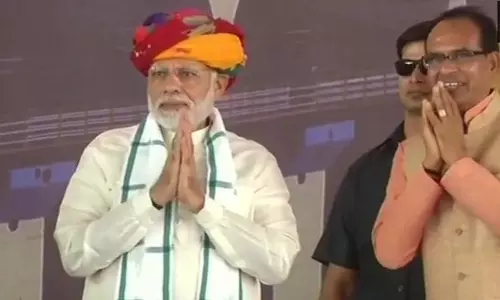
Brexit on tight rope
text_fieldsIt was on 16 June 2016 that British Labour MP Jo Cox, was shot to death in front of Birstall Library in Yorkshire. When talks regarding Britain exiting (Brexit) from the European Union (EU) had reached their crescendo, Jo Cox was the main spokesman of the Labour Party which had strongly advocated Britain's staying with the EU.
The one who fired the bullet at the 41-year old Jo Cox was Thomas Mair a worker of the extreme right and pro-Brexit party 'Britain First'. The guilt of Cox was that he openly said that millions of immigrants in Britain had to be protected. Within a week thence, the Brexit referendum was held; and as expected the verdict was in favour of the anti-immigrant and extreme nationalist groups of the country. Despite the opposition by two prominent parties, 52% of the people supported the withdrawal from EU. Thus Brexit became a signal of how narrow the countries of the EU - which had embraced the dream of "world without national borders" – were.
There are those who termed the Brexit result as 'earthquake', and some who had warned right then that it was capable of pushing a country centuries backward. It was certain that Britain would become politically and economically isolated in the region. And probably because signs of that had been felt right from the beginning, Prime Minister Theresa May decided that Britain would only have 'soft Brexit' with the EU through negotiations. She adopted a policy of getting out of the Union technically, but at the same time maintaining the current relations with the EU as far as possible. This was necessary for the existence of Britain. But the Brexit supporters in the ruling Conservative party opposed this. It was when May was about to move forward ignoring them, that three ministers resigned, putting the party and the government in deep crisis. Foreign Secretary Boris Johnson, Brexit Secretary David Davis and his deputy ministers are the ones who have thus aired their voice of protest. Boris Johnson and his group uphold the contention in favour of an entirely 'free' Britain. 48 of the party's 316 MP's are with them. There are many an observer sharing the view that the motivation of Boris is to grab the prime ministership - which he had lost between the cup and the lip two years ago – ousting May who is surviving on the support of small parties. In any case, the new political developments have made matters more complicated.
The roots of neo-Nazism had gripped Britain too in the '90's as it did other European countries. It was in the very year of EU's formation, i.e. 1993, that the extreme right UK Independence Party (UKIP) came into being in Britain. When UKIP, with the hallmark of British Unionism and race-based anti-immigration stance, and like-minded parties found space in the mainstream, changes started appearing in the political perspectives of Britain. It is worthwhile to recall that UKIP which could win only one seat in the 2015 election, became the main champion of Brexit campaign the very next year. And with the support of a section of Conservatives led by Boris Johnson, the Brexit outcome turned out to be in their favour. Now the pro-Brexit camp is arguing that when the EU became a reality, immigration to Britain increased which destroyed their peace of mind. They also cite as 'examples' the job losses for British people and the extremist attacks in the region. But they don't utter a word about the gains Britain had derived from immigration.
Britain for the last two years, has been experiencing e the after-effects of the move which ignores all such gains. Within two days from the result of referendum, the country's inflation rose by 1.67 per cent. Within two years, the gross national product decreased by 2.5 per cent and that caused a loss of 23 billion pounds. By the time the Brexit processes are completed, Britain will get out of 148 contracts with the member countries of EU. At that point, Britain will have to seek other sources for even basic needs in several areas including trade and research. And the Conservatives have not yet been able to put forward any concrete alternatives. In such a situation, Theresa May's conciliation talks should have found acceptance. But Boris' obstinate stance that 'soft Brexit' cannot be accepted not only deepened the crisis, but also became a political weapon against Theresa May. If Boris tightens his grip in this political battle, that is bound to land Britain in real trouble.











